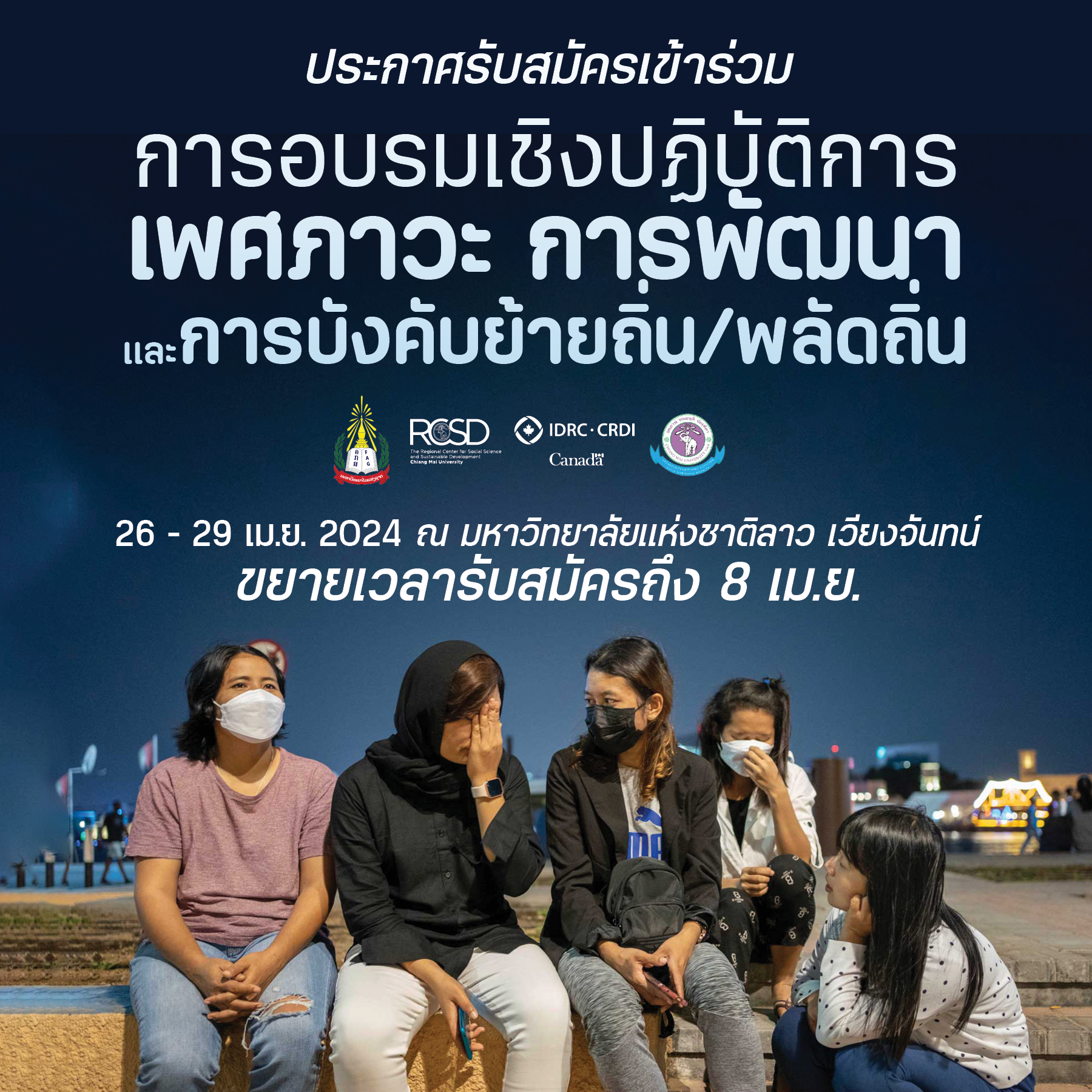การอบรมเชิงปฏิบัติการ เพศภาวะ การพัฒนา และการบังคับย้ายถิ่น/พลัดถิ่น (Gender, Development and Forced Displacement) วันที่ 26-29 เมษายน 2567 จัดโดย ศูนย์ภูมิภาคด้านสังคมศาสตร์และการพัฒนาอย่างยั่งยืน (RCSD), ศูนย์สตรีศึกษา (WSC) คณะสังคมศาสตร์ มหาวิทยาลัยเชียงใหม่ และ มหาวิทยาลัยแห่งชาติลาว
หมดเขตรับสมัครวันที่ 5 เมษายน 2567 สมัครออนไลน์ได้ที่นี่
ช่วงระยะเวลาที่ผ่านมา รายงานและบทวิเคราะห์ประเด็นการบังคับย้ายถิ่น/พลัดถิ่น (Forced Displacement) มักจะมุ่งเน้นไปที่สาเหตุจากความขัดแย้ง ภัยพิบัติ การเปลี่ยนแปลงสภาพภูมิอากาศ และโครงการพัฒนาต่างๆ และยังไม่ได้มีการกล่าวถึงประสบการณ์ผู้ถูกบังคับย้ายถิ่นที่เชื่อมโยงอยู่กับอัตลักษณ์ทางสังคมและปัจจัยทางสังคมและเศรษฐกิจที่แวดล้อมปัจเจกมากนัก แม้ว่าจะมีผู้สนใจอธิบายปรากฏการณ์การบังคับย้ายถิ่น/พลัดถิ่น ผ่านกรอบการวิเคราะห์ด้านเพศภาวะ (Gender) มากขึ้น แต่ดูเหมือนว่าการวิเคราะห์ประเด็นทางเพศภาวะผ่านความสัมพันธ์ทางอำนาจและอัตลักษณ์ทางเชื้อชาติ ชาติพันธุ์ ศาสนา และสถานะทางสังคมอื่นนั้นยังไม่ได้มีการนำมาพิจารณาร่วมกันอย่างรอบด้านเท่าไรนัก อีกทั้ง งานศึกษาส่วนใหญ่ยังคงละเลยประสบการณ์ของปัจเจกผู้มีความหลากหลายทางเพศ (LGBTIQ+) ออกไปด้วย ดังนั้น เพื่อที่จะสร้างความรู้ความเข้าใจในประเด็นเหล่านี้มากขึ้น จึงมีความจำเป็นที่จะต้องทำความเข้าใจถึงมิติเรื่องเพศภาวะและความหลากหลายของอัตลักษณ์ทางสังคม (Intersectionality) ในบริบททางการเมือง สังคมและเศรษฐกิจที่มีความเฉพาะไปด้วย เช่นเดียวกับการนำแนวคิดเหล่านี้มาวิเคราะห์ร่วมกันในประเด็นของ “การพัฒนา” ว่าได้กำหนดสร้างประสบการณ์ทางสังคมให้กับผู้คนกลุ่มต่างๆที่มีอัตลักษณ์ที่แตกต่างและทับซ้อนกันได้อย่างไร และเงื่อนไขทางสังคมที่ซับซ้อนเหล่านี้ได้นำไปสู่การถูกบังคับย้ายถิ่น/ผลัดถิ่นได้อย่างไร
ด้วยเหตุนี้ ศูนย์ภูมิภาคเพื่อสังคมศาสตร์และการพัฒนาอย่างยั่งยืน (RCSD) ศูนย์สตรีศึกษา (WSC) คณะสังคมศาสตร์ มหาวิทยาลัยเชียงใหม่ และศูนย์เพศภาวะศึกษา มหาวิทยาลัยแห่งชาติลาว จึงได้จัดการอบรมเชิงปฏิบัติขึ้น ในระหว่างวันที่ 26-29 เมษายน 2567 ณ เมืองหลวงเวียงจันทร์ สปป.ลาว โดยมีจุดประสงค์เพื่อสร้างความรู้ความเข้าใจเรื่องเพศภาวะ (Gender) และอำนาจทับซ้อน (Intersectionality) ของอัตลักษณ์ทางสังคมที่หลากหลาย ความรุนแรงบนพื้นฐานทางเพศภาวะ (Gender-based Violence) แนวคิดสตรีนิยมหลังอาณานิคม (Postcolonial feminism) และการปฏิบัติการในบริบทการพัฒนาที่เชื่อมโยงอยู่กับการถูกบังคับย้ายถิ่น/พลัดถิ่น โดยการอบรมครั้งนี้จะนำแนวคิดเรื่องเพศภาวะ (Gender) แนวคิดหลังอาณานิคม (Postcolonial theory) และแนวคิดเรื่องอำนาจทับซ้อน (Intersectionality) ของอัตลักษณ์ทางสังคมที่หลากหลาย เพื่อช่วยให้ผู้เข้าร่วมกิจกรรมสามารถนำไปวิเคราะห์แนวคิดและนโยบายการพัฒนาว่าส่งผลต่อชีวิตประจำวันและประสบการณ์ทางสังคมของผู้คนที่มีอัตลักษณ์ทางสังคมที่แตกต่างหลากหลายอย่างไร และเงื่อนไขทางสังคมเหล่านี้ส่งผลต่อการถูกบังคับย้ายถิ่น/ผลัดถิ่นอย่างไร และความเข้าใจดังกล่าวจะนำไปสู่การร่วมกันหาทางออกต่อวิกฤตและปรากฎการณ์การถูกบังคับย้ายถิ่น/พลัดถิ่นได้อย่างไร
คุณสมบัติผู้สมัคร
การประชุมเชิงปฏิบัติการครั้งนี้เปิดรับผู้สมัครจากไทย ลาว หรือผู้ที่สามารถสื่อสารภาษาไทย เป็นกลุ่มนักวิจัย นักวิจัย นักพัฒนา หรือผู้จัดทำนโยบายรุ่นกลาง และนักศึกษาทั้งระดับปริญญาตรี ระดับบัณฑิตศึกษา ที่กำลังศึกษาหรือจบการศึกษาจากคณะสังคมศาสตร์ (Social Sciences) และมนุษยศาสตร์ (Humanities) หรือสาขาอื่นๆ ที่มีความสนใจหรือประสบการณ์การทำงานในประเด็นเพศภาวะและการบังคับพลัดถิ่น
จำนวนผู้เข้าร่วม 15-18 คน
ทุนสนับสนุน: ผู้เข้าร่วมการประชุมเชิงปฏิบัติการครั้งนี้จะได้รับการสนับสนุนค่าเดินทาง ค่ารถโดยสารสาธารณะและค่าที่พัก (โดยมีจำนวนทุนจำกัด).
การสมัคร
ผู้สนใจสมัครการประชุมเชิงปฏิบัติการครั้งนี้สามารถกรอกแบบฟอร์มออนไลน์ พร้อมกับแนบ Curriculum Vitae ที่แสดงให้เห็นถึงระดับการศึกษาและประสบการณ์ที่เกี่ยวข้อง อีกทั้งความเรียงในภาษาไทยหรือภาษาอังกฤษ (จำนวน 1-2 หน้า) แสดงให้เห็นความสนใจในประเด็นเพศภาวะ การพัฒนาและการบังคับย้ายถิ่น/พลัดถิ่น และผู้สมัครจะสามารถนำความรู้ ประสบการณ์มาแลกเปลี่ยนในการประชุมได้อย่างไร
This workshop will be held in Thai/Lao/English languages from 26th – 29th April 2024 at the National University of Laos and is organized by the Regional Center for Social Science and Sustainable Development (RCSD), Women’s Studies Center of the Faculty of Social Sciences, Chiang Mai University, Gender Studies Center, National University of Laos.
Application deadline is 5 April, 2024. Apply online here
Reports and analyses often provide aggregate figures on forced displacement due to conflict, disasters, climate change, and development projects. These figures overlook the unique experiences of displaced individuals based on their identities and socio-economic factors. While gender-focused analysis is more common, it tends to oversimplify the complex intersection of identities, including race, ethnicity, religion, and socioeconomic status. To address these issues, an intersectional approach is needed to understand how gender intersects with various identities and backgrounds affect people’s experiences in relation to various development projects and lead to forced displacement at the end.
The 4-day workshop will be organized by RCSD, the Women’s Studies Center (WSC), and the National University of Laos will explore gender, intersectionality, multiple identities, gender-based violence, postcolonial feminism, and agency in the context of different development projects and in relation to forced migration and forced displacement. The workshop will apply gender concepts, postcolonial concepts, and the intersectional approach to analyses development concepts and policies. This workshop will help participants to examine and analyses how development projects affect everyday life of people who have multiple identities in different ways. How these political, social, economic conditions and cultural identities have an impact on forced migration and forced displacement? How can or may we respond better to crises and phenomena of forced displacement?
Details: The workshop will run in Thai, Laos, and English, yet some reading materials will be in English.
Application deadline: 5 April 2024.
Qualifications: The workshop is open for Thai/Lao speaking applicants. Those should be young & mid-career researchers, development practitioners, policy-makers and graduate students attending relevant undergraduate and postgraduate programs in social sciences and humanities and with interest in gender and forced displacement. As the workshop will be conducted in Thai, Lao, and English, participants who can communicate in Thai (both reading and speaking) are required.
Number of participants: 15-18
Funding: Limited funding is available to provide travel support for qualified individuals, including local transportation, and accommodation. Partial funding request for Thai participants are encouraged.
How to apply
Those interested in applying for the workshop should 1) fill in the application form online here along with a curriculum vitae that lays out educational qualifications and relevant experiences and an essay in Thai or English (1-2 pages) that explains why the applicant is interested in this topic: Gender, Development, and forced displacement and how your background and expertise can contribute to the workshop.

